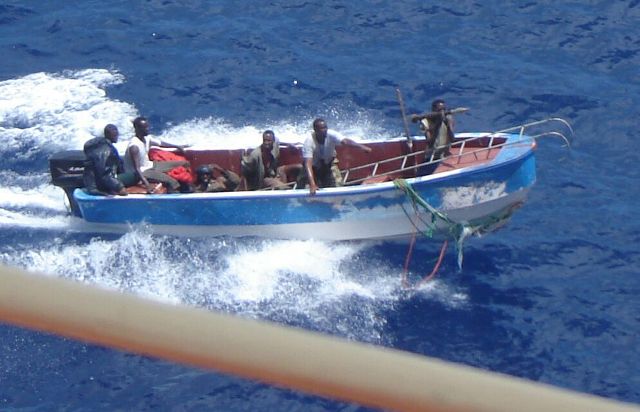Piracy Reporting Centre: Singapore Straits Emerge as Piracy Hotspot
Global piracy and armed robbery incidents against ships have risen sharply in the first quarter of 2025, with a notable 35% increase compared to the same period last year. The...

 By John A C Cartner, Special to Piracy Daily
By John A C Cartner, Special to Piracy Daily
Navy sounds sexy. Private navy sounds ultra-sexy. Typhon says it has one. Typhon does not.
A private vessel acting in a naval capacity must have a letter of marque issued to the vessel by a sovereign to permit the vessel to be armed and thus to act in a naval capacity. Typhon vessels neither carry letters nor are they armed as naval vessels or even naval auxiliary vessels. Therefore while these tubs are privately owned, they are not naval empowered.
Indeed, until other information is forthcoming, it seems that Typhon is doing nothing more than displacing armed guards away from the vessels that pay for the company’s putative protection rather than merely carrying the same armed guards on the protected vessels as a deterrent.
The only economic rationale one can see in this kind of arrangement is the marginal ability to protect several vessels with a slightly larger armed guard detachment in a convoy system. To the extent that can be done, these are merely armed guards on waterborne pogo sticks hopping around to where the threat may be.
Let us take another view. Would you rather be on a crew boat with armed guards being chased by an angry pirate or on a real ship with an armed guard detachment being chased by angry pirates? I’ll take the large one, thank you.
Moreover, to the extent that the Typhon boats are not where the threat lies requires more of its vessels. The vulnerability in the scheme is that without spot-on intelligence—and a lot more surveillance power than Typhon is likely to have as a start-up entity—it is very difficult to minimize the number of protective vessels, which the economy of profit requires, and to simultaneously maximize the protective force.
The problem of maximization of naval presence, whether presence of offensive or defensive or deterrent or suppressive forces or force protection, and the minimization of costs is the essential naval problem and one of such complexity and demanding of such resources that I doubt that Typhon can solve it.
Samuel Pepys in the 17th century identified the problem. No sovereign navy has solved it since except by loosening the cost side of the equation. Sovereigns have huge sums of money to spend on admiralty so cost becomes not the driving factor. Profit and capital to make profit do not view things that way. Cost is the driver in the commercial model.
So what do we have here? From these perspectives Typhon is offering hype and sexy words with no demonstrated betterment to the armed guard system when those guards are carried on their own vessels.
Typhon is not a reprise of anti-unterseebooten tactics; the Typhon boats are not Destroyer Escorts. Typhon is not a private navy in form, money or substance
As Charles Revson once said, “We do not sell [Revlon] cosmetics; we sell hope.”
Perhaps Typhon’s model is the Revson model.
Typhon is not a private navy.
John A C Cartner is an unrestricted master mariner (US) and maritime lawyer practicing in Washington, DC and practising in London and is the principal author of The International Law of the Shipmaster(2009). He can be reached at [email protected]
© 2013 John A C Cartner, all rights reserved. Republished with permission from Piracy Daily

Sign up for gCaptain’s newsletter and never miss an update

Subscribe to gCaptain Daily and stay informed with the latest global maritime and offshore news


Stay informed with the latest maritime and offshore news, delivered daily straight to your inbox
Essential news coupled with the finest maritime content sourced from across the globe.
Sign Up